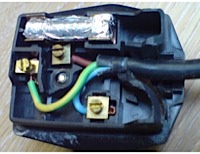 Here is a question to the blog clinic from Gordon (not his real name).
Here is a question to the blog clinic from Gordon (not his real name).
Do electrical certificates need to be provided to tenants for appliances, if so how often?
If these are not provided to the tenant can this invalidate a Section 21 Notice?
Answer
At present, there are no requirements on landlords to have any checks done or certificates to prove this.
However there are product safety regulations which provide that items in rented properties need to be in a safe condition. The best way of proving this is either to provide new appliances or have them checked with a certificate to prove this.
The test that you use is called PAT which is short for Portable Appliance Testing. A portable appliance is basically any appliance with a plug attached to it. For example personal computers, and their equipment (monitor, speakers etc), kettles, irons, leads, cables, toasters, printers, etc
Getting Portable Appliance / PAT testing done
PAT testing is not hugely expensive, you can expect to pay about £25-35 which will cover testing about 10-20 appliances. You can find companies which do this online or in Yellow Pages, plus there is a helpful directory here. Some companies specifically advertise a service for landlords.
Make sure that you keep a record of the appliances tested, so if there is any problem later you can prove that you have had it done
To be on the safe side, it is probably best to get items tested every time a tenancy ends before renting to new tenants but I suspect that not many landlords do this. Do YOU do PAT testing and if so how often?
Section 21
At present, there is no legal requirement to get appliances tested, so it will not affect your section 21 notice if this is not done.
However, I understand that government is considering introducing regulations relating to electrical safety. If this happens I would not put it past them to include serving some form of certification on the tenants as something that needs to be done before a valid section 21 notice can be served.
But as of now (April 2016) this is not a requirement.
“To be on the safe side, it is probably best to get items tested every time a tenancy ends before renting to new tenants but I suspect that not many landlords do this. Do YOU do PAT testing and if so how often?”
Just “probably best” Tessa? Tenant safety should be a landlord’s first priority. Then again, this is England.
“I would not put it past them to include serving some form of certification on the tenants as something that needs to be done before a valid section 21 notice can be served”
Do you mean it to sound like it’s all such a drag?
Well I agree actually I think it should be done but its easy for me to say. I’m not a landlord myself, I just advise. I appreciate that sometimes there may be practical difficulties for landlords in getting this done if tenants are moving in fairly soon after the property has been vacated.
You have to consider the risk; a washing machine that is never moved has a lot lower risk then a metal kettle. If the consumer unit has a RCD the risk is also reduced.
If PAT testing come in for washing machines and fridges in single lets, unless agents get there staff trained to do the test, I expect most landlords will just stop providing washing machines and fridges.
I run a PAT testing company and offer services for landlords and letting agents. It is a common misconception that it is only portable aplliances or appliances with a plug that need testing. The IET code of practice 4th edition provides more information on this. You are just as likely to get a fire or electrical risk from a hardwired faulty oven as you are from something like a kettle. From experience i have discovered a lot of issues with appliances like ovens and hobs being faulty or wired in poorly. I have also seen numerous problems where there has been a direct risk of electric shock with exposed live parts. I put example pictures of common faults encountrred on my website and most landlords are happy that i pick up these kind of issues.